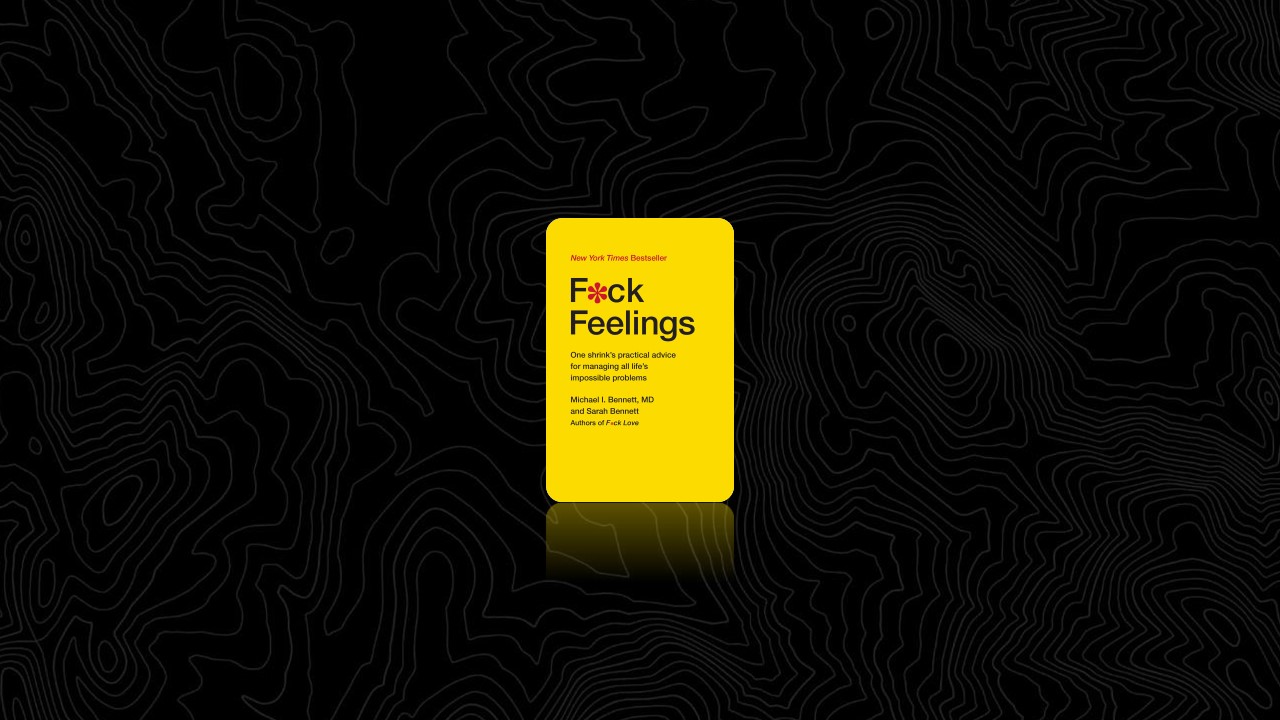Fuck Self-Improvement
Buying a self-help book is usually the second-to-last step to surrendering to a crisis of self, the last step being therapy and the first step being a gym membership, or at least a Zumba DVD or a pamphlet for the Learning Annex.
Dedication to improving yourself is admirable—and if you’re Oprah, unbelievably lucrative—but what separates this book from your average work of Deepak Chopra is that we can tell you, up front, that being prepared to make whatever sacrifice is necessary to improve yourself doesn’t mean you can do it. You can’t somehow get taller once you’ve stopped growing; there are limits to your physical strength and intellectual ability, no matter how rigorously you train; and, odds are, you have done too many drugs to ever be president.
Eventually, striving to improve yourself brings diminishing returns and prevents you from accepting yourself and living with what you’ve got. That’s one reason self-improvement efforts have to take into account your limits and competing priorities. Otherwise, it’s less self-improvement, more self-sabotage.
Taking Back the Reins of Your Life (After a Stampede)
Since humans control very little besides their DVR queues and their opinions about Miley Cyrus, it’s not surprising that we often feel like our lives are slipping into chaos. Sometimes it’s because you’re actually losing control, sometimes because someone close to you is spinning out, and sometimes because whatever you don’t control feels far more important and overwhelming than what you do
Feeling helpless doesn’t mean that everything is going to turn out badly or that you’re doing a poor job with your life. If you can ignore the terrible meltdown feeling and take credit for how you’re handling the problem, rather than getting carried away or feeling too responsible, you’ll have much to be proud of and many more options to consider.
If you do blame yourself for the mess you’re in, simply because it happened on your watch, you’ll weaken and distract yourself at a time you need to be stronger. If you dwell on second-guessing yourself and believing you deserve punishment, you’ll have more trouble figuring out the smart thing to do, giving strength to others, and tolerating painful feelings without panicking.
Getting to the Root of Your Problem . . . and Tearing It Out
It’s not clear when people started equating solving emotional issues with retracing your steps in order to find your car keys, but if you retrace your steps to uncover the ultimate source of your problems, you won’t usually find it. On the plus side, you might find your sunglasses.
What people hate to consider, even after root seeking has been getting them nowhere for some time, is that, sometimes, it just doesn’t work. There are lots of problems we’ll never know the answer to. There’s nothing wrong with looking for answers that might actually exist, but, when the search isn’t bearing fruit, there’s a strong possibility that answers aren’t to be had, and obsessing about finding them is a distraction to figuring out where the real keys are—and what you’re going to do next.
What neurobiology has taught us is that every action we take depends on multiple unique subcapacities, and all it takes is for one of those subcapacities to be weak or broken, and our ability to function is compromised.
If you resume drinking, it’s not because you’re a weak person, but because drinking triggers something in your brain that says, “I’ve got to do that again.” If you have trouble with paperwork, it may be because your brain has trouble translating or using written symbols in a specific way (numbers, maps, English). If you can’t change whom you’re attracted to, you may be directed by a part of your brain that, whether it was programmed before birth or a few years later, can’t be changed now.
Of course, knowing there’s no root answer, or that, at the very least, it’s unobtainable, doesn’t relieve you of responsibility for dealing with a problem; it just spares you having to take an exam on its origins.
Becoming a More Positive Person
Negative feelings, particularly anger, self-pity, and envy, are painful to feel and also to hold back, since unleashing them makes you a jerk who’s a drag to be around. It’s like having to hold in a full bladder all the time, except it’s your mouth, and if you let it go, it could release things so hurtful, mean, and unjustified that you’d prefer having a wet crotch.
So when it comes to becoming more positive and less negative, many people would like to cleanse themselves of negative feelings, remove the temptation to act like a dick, and ease the strain of constant self-monitoring and self-restraint that often makes them tense and cranky and causes them to be dickish despite themselves.
Unfortunately, many things that promise relief from negative feelings aren’t good for you and won’t really make you a better person, even if they make you feel better. You can be justified in attacking someone, physically or verbally, but the satisfaction it brings is limited; it often leaves you with a bad feeling in the long run and gets you more involved with someone you’d like to stay away from.
You might also try to become more positive by withdrawing from whatever causes you to feel negative, but that’s not so hot if it requires you to shed responsibilities, abandon people who need you, or dull down your personality. You may wind up with a serene smile but you may also have betrayed your own standards of behavior.
Stop Fucking Up
As soon as you accept who you are, think hard about the standards you want to live up to and less about looking normal, pleasing authorities, or competing with others. Use those standards to manage your inner fuckup by redoubling your efforts to learn whatever you really care about and manage bad behavior.
Rely on your own standards for defining hard work, reliability, and self-reliance, and use your gifts to achieve them in your own way. If your career happens to lack prestige or follows an unconventional, restless path, don’t criticize yourself. Respect yourself all the more for having found a way to meet standards using equipment you didn’t choose and given habits that are hard to break.
Remember, fucking up doesn’t mean getting bad results; it means not doing your best with what you’ve got. As long as you’ve developed values you believe in, and have reason to think you’re doing your best to work at living up to them, you’ll always be a success, even if learning you’ve got a wacky brain is hard to swallow.
Curing Yourself of Addiction
No matter how much evidence accumulates that our potential for addictions of all kinds (controlled substances, sex, edible substances, Internet, horrible people) owes more to causes we don’t control, like our genes, than those we do, we continue to experience addictions as moral failures and respond accordingly. Usually, that response means hiding the addiction and condemning others who have it—at least if you’re in politics.
Once you can accept that life, in fact, sucks, and the tons of bad stuff to be born and/or stuck with is distributed unevenly, unfairly, and undeservedly, recovery from addiction becomes much less impossible.
Trying to make bad impulses go away, or to scare or cry or communicate them into submission, usually doesn’t work and may actually increase your neediness and drive you back to your addictions. Long story short, most of what you’ve seen on Intervention doesn’t fly in real life.
Instead, improvement begins with acceptance of the permanence of what’s wrong and a realization that there are, nevertheless, good reasons for pushing yourself to manage flaws that will never stop being a painful burden.
As everyone in recovery knows, there’s no moment of victory and absolute, eternal sobriety. Success over addiction means knowing why being unaddicted is worthwhile, and trying as hard as you can to stay that way, no matter how harsh the truth of your past, present, or future may be.


